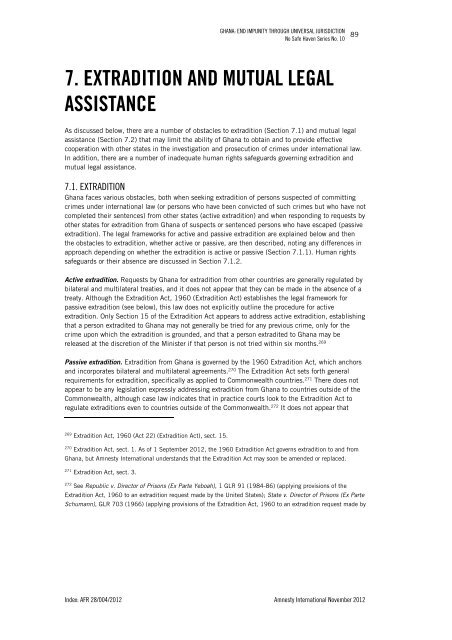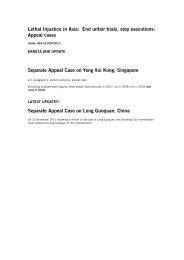Ghana - Amnesty International
Ghana - Amnesty International
Ghana - Amnesty International
Create successful ePaper yourself
Turn your PDF publications into a flip-book with our unique Google optimized e-Paper software.
GHANA: END IMPUNITY THROUGH UNIVERSAL JURISDICTIONNo Safe Haven Series No. 10897. EXTRADITION AND MUTUAL LEGALASSISTANCEAs discussed below, there are a number of obstacles to extradition (Section 7.1) and mutual legalassistance (Section 7.2) that may limit the ability of <strong>Ghana</strong> to obtain and to provide effectivecooperation with other states in the investigation and prosecution of crimes under international law.In addition, there are a number of inadequate human rights safeguards governing extradition andmutual legal assistance.7.1. EXTRADITION<strong>Ghana</strong> faces various obstacles, both when seeking extradition of persons suspected of committingcrimes under international law (or persons who have been convicted of such crimes but who have notcompleted their sentences) from other states (active extradition) and when responding to requests byother states for extradition from <strong>Ghana</strong> of suspects or sentenced persons who have escaped (passiveextradition). The legal frameworks for active and passive extradition are explained below and thenthe obstacles to extradition, whether active or passive, are then described, noting any differences inapproach depending on whether the extradition is active or passive (Section 7.1.1). Human rightssafeguards or their absence are discussed in Section 7.1.2.Active extradition. Requests by <strong>Ghana</strong> for extradition from other countries are generally regulated bybilateral and multilateral treaties, and it does not appear that they can be made in the absence of atreaty. Although the Extradition Act, 1960 (Extradition Act) establishes the legal framework forpassive extradition (see below), this law does not explicitly outline the procedure for activeextradition. Only Section 15 of the Extradition Act appears to address active extradition, establishingthat a person extradited to <strong>Ghana</strong> may not generally be tried for any previous crime, only for thecrime upon which the extradition is grounded, and that a person extradited to <strong>Ghana</strong> may bereleased at the discretion of the Minister if that person is not tried within six months. 269Passive extradition. Extradition from <strong>Ghana</strong> is governed by the 1960 Extradition Act, which anchorsand incorporates bilateral and multilateral agreements. 270 The Extradition Act sets forth generalrequirements for extradition, specifically as applied to Commonwealth countries. 271 There does notappear to be any legislation expressly addressing extradition from <strong>Ghana</strong> to countries outside of theCommonwealth, although case law indicates that in practice courts look to the Extradition Act toregulate extraditions even to countries outside of the Commonwealth. 272 It does not appear that269Extradition Act, 1960 (Act 22) (Extradition Act), sect. 15.270Extradition Act, sect. 1. As of 1 September 2012, the 1960 Extradition Act governs extradition to and from<strong>Ghana</strong>, but <strong>Amnesty</strong> <strong>International</strong> understands that the Extradition Act may soon be amended or replaced.271Extradition Act, sect. 3.272See Republic v. Director of Prisons (Ex Parte Yeboah), 1 GLR 91 (1984-86) (applying provisions of theExtradition Act, 1960 to an extradition request made by the United States); State v. Director of Prisons (Ex ParteSchumann), GLR 703 (1966) (applying provisions of the Extradition Act, 1960 to an extradition request made byIndex: AFR 28/004/2012 <strong>Amnesty</strong> <strong>International</strong> November 2012
















